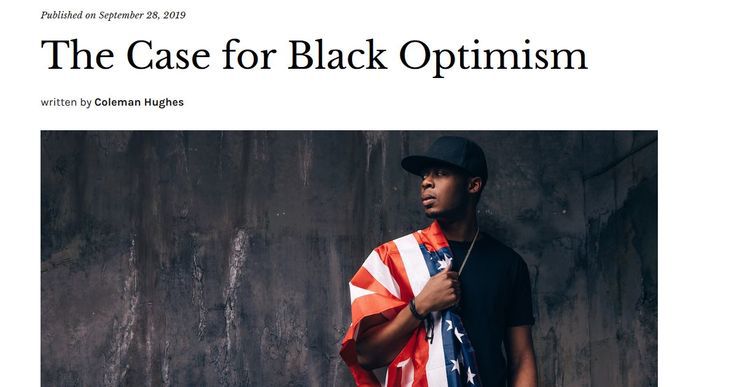
By Steve Sailer
09/30/2019
From Quillette:
The Case for Black Optimism
written by Coleman HughesPublished on September 28, 2019
When was the last time you heard good news about the state of black America? … Though it has gone largely unnoticed, black Americans have been making rapid progress along most important dimensions of well-being since the turn of the millennium.
… From 2001 to 2017, the incarceration rate for black men declined by 34 percent. Even this statistic, however, understates progress by lumping black Americans of all ages together. When you look at age-specific incarceration outcomes, you find two opposing trends: Older black Americans are doing slightly worse than previous generations, but younger black Americans are doing better — so much better that they more than offset, in statistical terms, the backslide of their elders. To put the speed and size of the trend in perspective, between my first day of Kindergarten in 2001 and my first legal drink in 2017, the incarceration rate for black men aged 25–29, 20–24, and 18–19 declined, respectively, by 56 percent, 60 percent, and 72 percent. For young black women, the story is similar: a 59 percent drop for those aged 25–29, a 43 percent drop for those aged 20–24, and a 69 percent drop for those aged 18–19.
Basically, blacks bottomed out during the Crack Era centering on 1991. Since then, they’ve started to realize that their gangsta rap albums don’t actually offer good advice on how to live one’s life.
… The great incarceration decline for black youth has been matched by a decline in teenage motherhood. Between 2001 and 2017, the birth rate for black women aged 15–19 declined by 63 percent. In fact, the black teenage birth rate in 2017 was lower than the white teenage rate as recently as 2002.
Nor has progress been confined to the younger generation. Between 1999 and 2015, the mortality rate for black Americans aged 65 and over shrank by 29 percent for cancer, 31 percent for diabetes, and 43 percent for heart disease. What’s more, all of those percentage drops were larger than the drops experienced by comparable whites over the same period. As deaths from disease have plummeted, black lives have extended. In 2017, black female life expectancy was 78.5 years, up from 75.1 years in 2000. Life expectancy for black men increased from 68.2 to 71.9 years over the same timespan.
Not only are black Americans healthier and longer-lived than they were two decades ago, they’re also more educated. Between the 1999–2000 and 2016–2017 school years, the number of black students who earned bachelor’s degrees increased by 82 percent, from 108,018 to 196,300. …
All told, there is more than enough data with which to tell an optimistic story about the recent history of black America. However, the same data that justify this optimism can appear to justify pessimism if you look at it differently. Recall, for instance, the 72 percent drop in the incarceration rate for black men aged 18–19 from 2001 to 2017. Framed as such, it looks like progress. But here’s the same data framed differently: In 2001, black men aged 18–19 were nine times more likely to be behind bars than comparable white men. By 2017, they were twelve times more likely to be behind bars. Framed as such, it looks like regress.
Here’s a question I’ve never seen addressed: My impression is that in the second half of the 20th Century, African Americans had a severe dysgenic/dyscultural fertility problem: Black women college graduates had very few children and black women high school dropouts had many children and short generation times. But, after 1991 or so, the high fertility of underclass black women started to decline rapidly.
Of course, the fertility of educated black women didn’t go up, but it is possible that, say, blacks who are turning 18 this year tended on average to come from somewhat higher up the social scale than blacks who turned 18 in 1991 — i.e., those born immediately after Roe v. Wade on 1/22/73. As I pointed out in answer to Steven Levitt’s Freakonomics theory that Roe v. Wade cut crime, blacks born in the half decade after Roe had the highest homicide rates as teens in recorded U.S. history.
This was probably related to Roe initially being dysgenic/dyscultural for blacks. Levitt was misled by looking at the white pattern of contraception being used by the middle class and abortion used by the working class. But among blacks in the 1970s, the black underclass continued to use neither and thus had a lot of kids, and at young ages, thus producing a lot of foot soldiers for the Crack Wars of the early 1990s.
Black teen fertility spiked in the early 1990s, peaking in the black annus horribilis of 1991. But since then, there has been a sharp decline in black teen fertility, and poorer black women no longer seem to have vastly more children than non-poor black women.
So, I would imagine that the average black born in 2001 enjoyed slightly better nature and nurture than the average black born in 1991.
But I haven’t done the research myself and I’m not aware of anybody else doing it.
Another factor is the increasing numbers of black immigrants. At present, most are legal immigrants from the more bourgeois ranks of other countries, so they would tend to improve black averages in America. A rather important question is whether their children and grandchildren tend to maintain the immigrants’ bourgeois behavior or regress toward the African American mean. Has anybody studied this?
Here are a couple of papers from Alison Rauh on black immigrants, along with a lengthy discussion in the Marginal Revolution comments section featuring me.
This is a content archive of VDARE.com, which Letitia James forced off of the Internet using lawfare.